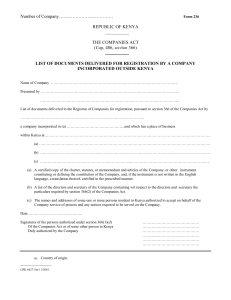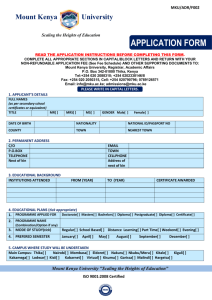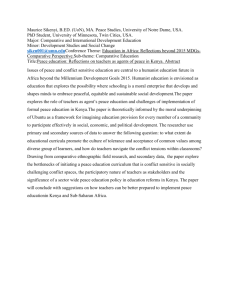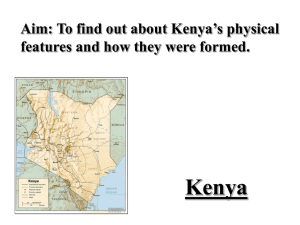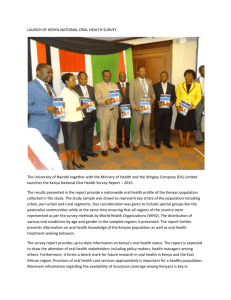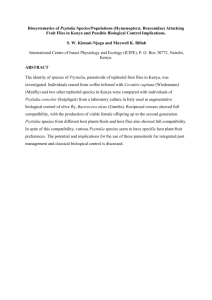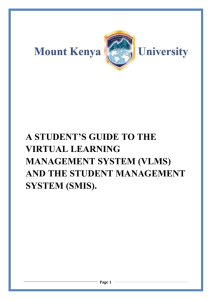research Division & Development
advertisement
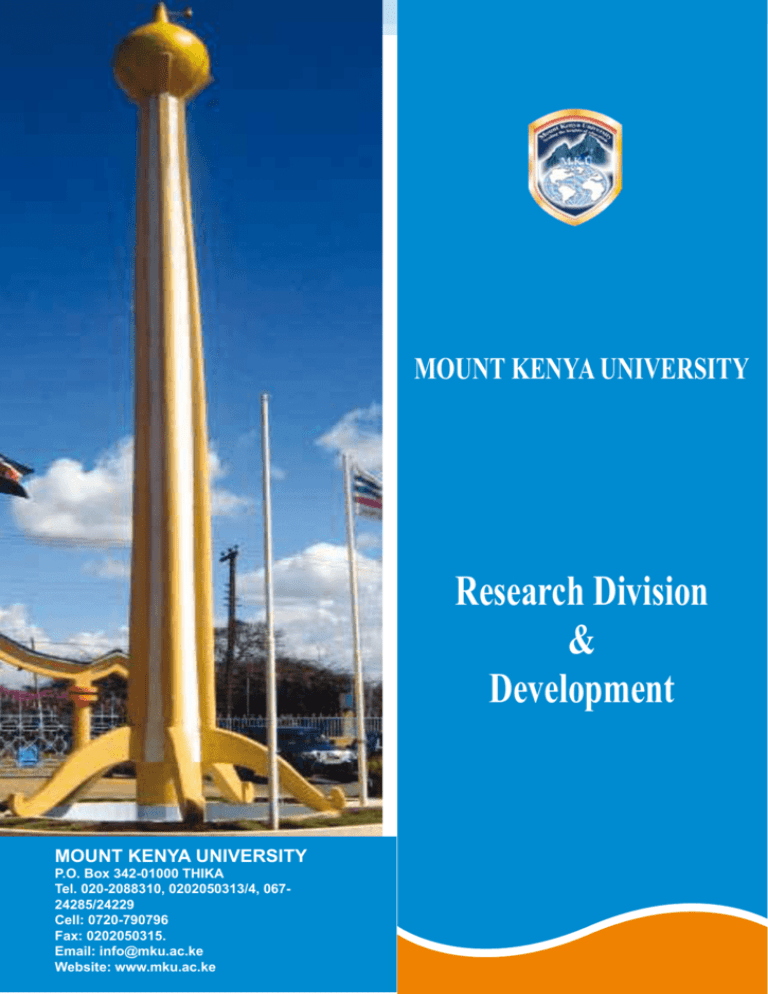
Mount Kenya University Research Division & Development MOUNT KENYA UNIVERSITY P.O. Box 342-01000 THIKA Tel. 020-2088310, 0202050313/4, 06724285/24229 Cell: 0720-790796 Fax: 0202050315. 1 Email: info@mku.ac.ke Website: www.mku.ac.ke ABOUT MOUNT KENYA UNIVERSITY Mount Kenya University (MKU) is a non-profit making institution established in May 2008. Its precursor is the famous Thika Institute of Technology. It was granted a Charter in January 2011 and is one of the rapidly expanding universities in East and Central Africa. It is a leading private university inclined towards science and technology programmes. In pursuit of its Vision and Mission, the university acknowledges the pivotal role research, innovation and other intellectual activities play in socioeconomic development of any society. The university recognizes that exploration and validation of novel ideas in research, innovation and other intellectual activities, new frontiers of knowledge are discovered. Thus, the University established the Research Division in March 2011 to serve as a vehicle to spearhead its research mandate. The university has a Directorate of Research and Development, headed by the Director, R&D. The fact that MKU is giving research a high priority is embodied in various policy documents including the MKU Research Policy, Enterprise and Linkages Policy, Intellectual Property Rights Policy and a 7-year Strategic Plan as well as funding initiatives such as the Internal Research Grant termed (Vice-Chancellor’s Grant) to fund researchers and innovators. The university encourages researchers and innovators to conduct research and other innovative activities geared towards the discovery and exploitation of new knowledge with the ultimate object of socio-economic development of the Kenya and the region in line with the objectives of Kenya’s Vision 2030 and the Millennium Development Goals. Welcome to the Research Division The key mandate of universities world over is mainly teaching and research. In many African countries including Kenya, the latter mandate has been relegated to the back seat. High quality university education involving training and research not only provides the human capital for socio-economic development but also transforms individuals and societies through poverty reduction and 2 increased global competitiveness. In this regard, the Research Division is striving to increase the quantity, quality and relevance of research output with a view to creating innovations and inventions that will enable the country to effectively transform into a knowledge-based economy. As evidence of the importance the Research Division lays on research, the structural frame work to guide research activities is actively being laid down. Since its inception, the Division has had major milestones in the pursuit of its core mandates which fall under the following strategic categories: a) Research b) Institutional Linkages c) Enterprise and innovation d) Community Outreach Research Division Vision To be a leader in addressing community socioeconomic needs through research and innovation. Research Division Mission To provide leadership in research and innovation for social and economic empowerment. Research is our passion MKU is committed to providing funds, necessary infrastructure and incentives for research. For instance, the University’s Vice-Chancellor’s Grant has continued to provide “seed funds” to support many aspiring researchers, and presently the Division is receiving proposals for Community-based research projects. The Division has continued to support dissemination of research findings by facilitating researchers publish their findings in peer-reviewed journals, and to participate in national and international forums. The Division holds monthly seminars and workshops geared towards research capacity building of staff members. The Division has continued to engage policy makers and various government institutions to increase support for research and development. The university for instance receives funding from NCST for sponsorship for research activities. Mount Kenya University Chairman, Mr Simon Gicharu (right) shakes hands with Trade Minister, Hon. Chirau Ali Mwakwere after the university signed an MoU with the Export Processing Zonmes Authority (EPZA) to advance knowledge economy Mount Kenya University senior staff with herbal medicine practioners after a consultative meeting . The university is spearheading an initiative to add value and commercialise herbal products through research Mount Kenya University senior staff and students join community leaders and residents in a clean up exercise. The university is conducting research on waste management in Nkubu Town, Meru. 3 Synergy through institutional linkages Mount Kenya University recognises the need to forge and sustain collaborations, partnerships and linkages among stakeholders and development partners in training and research. In particular, collaborations in research and development activities between stakeholders and development partners have potential to bring benefits to all the parties including minimizing costs and share risks because expenditure for R&D and field trials are typically lower in the developing as compared to the developed world. Internationally, collaborations will bring the benefit of opening access to each other’s markets. At the local level, mutual tapping into the strengths of each collaborating partner will not only leverage resources but also assist in capacity development occasioned by the learning opportunities involved. Embracing innovative & affordable solutions Many sub-Sahara Africa countries have majority of their citizens living below the poverty line, making it difficult for them to embrace expensive foreign-based technologies due to their limited purchasing power. Research and innovation focused on affordable technologies have the potential to provide increased benefits to the community and the country at large, and thus the university aims to generate innovations that are affordable so as to address the socio-economic needs of the people of this region. The university endeavours not only to develop technologies that will solve the problems that face African continent but also protect them. In this regard, the Research Division has developed an Intellectual Property Policy to encourage and protect inventions and innovations. Giving back to society Researchers often carry out research without involving all the stakeholders including the community who are the principal beneficiaries of research findings and innovations. The Research Division endeavours to involve the community in research to enable them embrace the innovations. The university is also committed to plough back the benefits of research to the community through diverse means such as community service. In this regard, the School of Health Sciences has continued to offer medical camps to the surrounding communities and beyond. Vision of the University Research Perspective • The division is in the process of establishing a Research Centre which will house various sections including Ethnomedicine and Drug Research, Cell and Molecular Biology, Cell and Tissue Culture , Microbiology and the Animal facility. • • The Division in collaboration with respective Schools is in the process of establishing various Research, undergraduate as well as postgraduate academic programmes. • • The Division will also enter a partnership with herbalists and KIPI to develop through research and value addition, a herbal product in what is dubbed as “Natural Product Initiative Programme”. The strategic objectives of Mount Kenya Uni- To be an African role model of excellence in science, technology, education and training. Mission of the University To provide world class teaching, research and innovative extension services for sustainable scientific and technological development. Strategic objectives of the university versity are to: • promote excellence in teaching, research and community service; • increase access and equity to quality higher education; • produce graduates who can apply scientific knowledge in a fast changing technological world; • undertake cutting edge research for generation of knowledge; • disseminate knowledge to the society; • stimulate innovations in applied science and technology; • equip learners with critical thinking and problem solving skills; • equip learners with both theoretical and practical skills in scientific and technological fields; • contribute positively to the welfare of humanity and human advancement; • stimulate learners’ intellectual growth. 4
